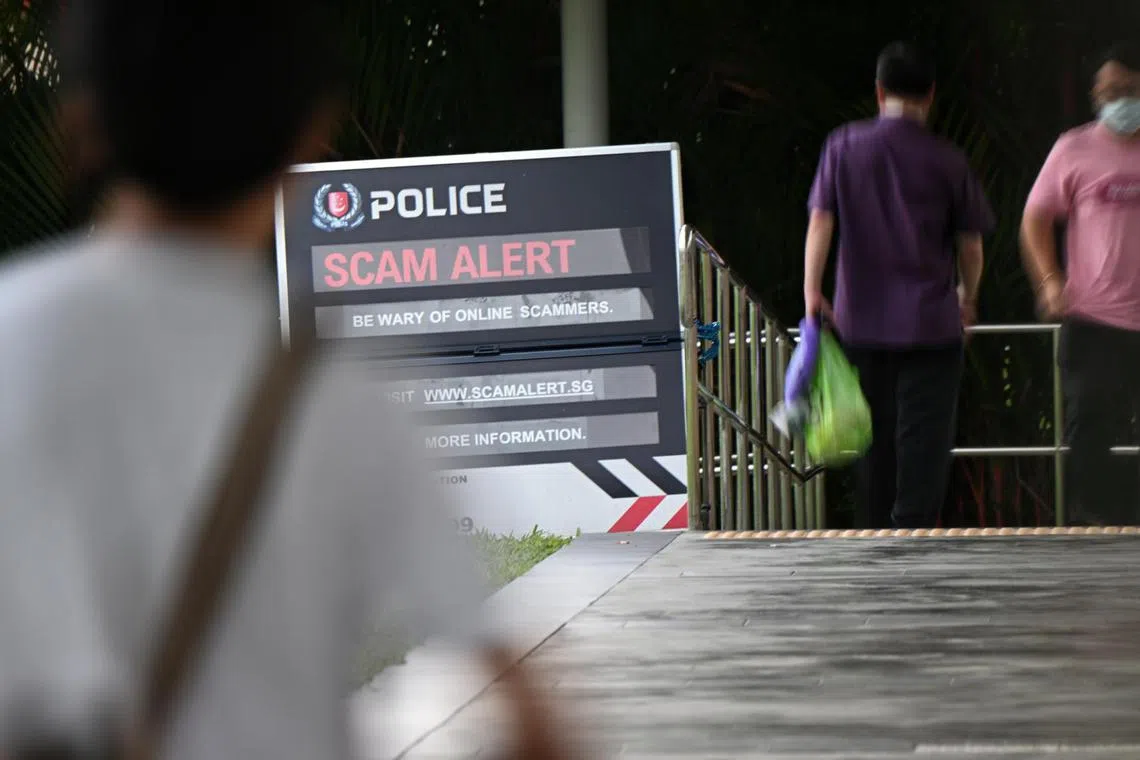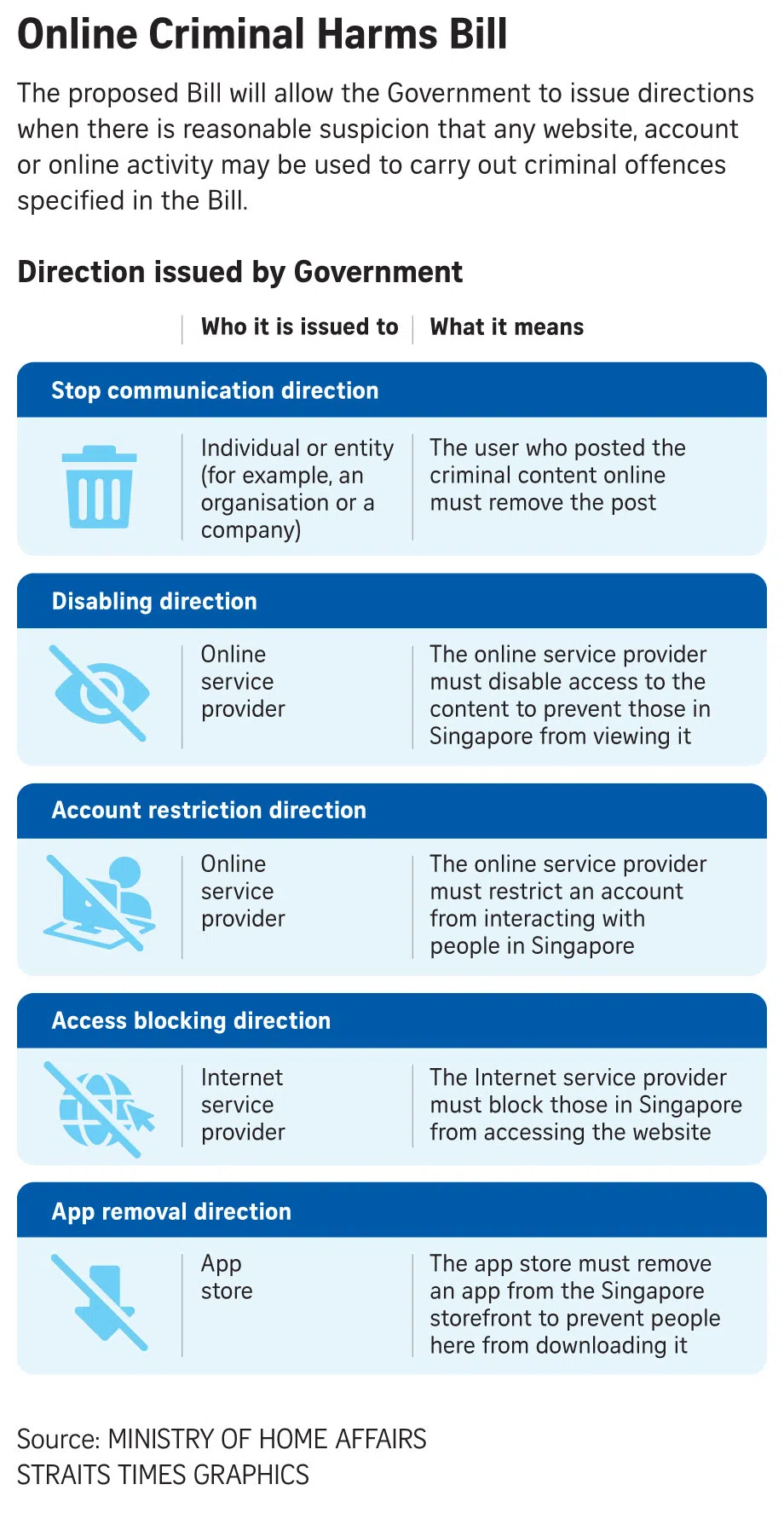Proposed law to allow Govt to tell app stores to remove harmful apps in S’pore used for cybercrime
Sign up now: Get ST's newsletters delivered to your inbox

MHA said the online space is increasingly being exploited by criminals.
ST PHOTO: KUA CHEE SIONG
Follow topic:
SINGAPORE - To better tackle cybercrime like scams and the dissemination of voyeuristic images, the Government may soon be given powers to remove online content, such as apps, that is criminal in nature.
The Online Criminal Harms Bill was tabled in Parliament on Monday. If passed, it will allow the Government to tell individuals, entities, online and Internet service providers, and app stores, to remove or block access to content that it suspects is being used to commit crimes.
The directions will apply to criminal offences specified in the Bill, including those that affect national security, racial and religious harmony, and individual safety.
Other offences covered by the Bill include incitement of violence, distribution of sexual abuse material, illegal moneylending and offences relating to psychoactive substances and controlled drugs.
In total, five types of government directions may be issued.
The first is a Stop Communication Direction, which requires the individual or entity, such as an organisation, that first posted the criminal content online to remove the post so it is not accessible in Singapore.
A Disabling Direction requires the online service provider to disable access to specified content, such as a post or a page, on its site to prevent people in Singapore from viewing it. Examples of online service providers include Facebook, TikTok, WhatsApp and WeChat.
When an Account Restriction Direction is issued, the online service provider must stop an account on its service from communicating in Singapore and interacting with those here.
An Access Blocking Direction requires the Internet service provider to block people in Singapore from accessing the site.
An App Removal Direction calls for the app store to remove an app from the Singapore storefront to prevent those here from downloading it.
Recipients of a government direction and those targeted by the direction can appeal to a reviewing tribunal to vary or cancel the decision. The tribunal will comprise a district judge or magistrate appointed by the president on the advice of the Cabinet.

The Ministry of Home Affairs (MHA) said: “We have also proposed a lower threshold for issuing government directions against scams and malicious cyber activities. This enables the Government to more effectively and swiftly disrupt scams and malicious cyber activities before the public falls prey.”
Such proactive approach is needed to counter the scale and speed achievable by criminal actors, especially when scams and similar malicious cyber activities can harm many in a short time, added MHA.
In 2022, scam victims in Singapore lost $660.7 million,
The ministry added that the Bill also creates a framework to strengthen the Government’s partnership with online services, which is important as tackling scams and cybercrime requires close collaboration between these parties.
MHA said the online space is increasingly being exploited by criminals and the Government has had to deal with such cases, including the dissemination of voyeuristic images and the sale of drugs on a variety of online platforms.
It cited a case where 23 men were arrested over online child sexual exploitation activities.
In 2022, 32 suspected drug offenders were arrested
The ministry noted that over the years, the Government has taken steps to deal with the different types of harmful online content and behaviours.
The Protection from Online Falsehoods and Manipulation Act, and the Foreign Interference (Countermeasures) Act, were introduced in 2019 and 2021, respectively, to deal with online falsehoods and foreign interference.
The Broadcasting Act was amended last year to deal with harms that impact user safety, such as suicide, self-harm, cyber bullying and content likely to undermine racial and religious harmony.
The amendments also allow the authorities to block access to egregious content on online social media platforms.
MHA told The Straits Times that in developing Singapore’s approach to tackle online criminal harms, the ministry studied the laws in several jurisdictions, including Germany, Australia and Britain.
It said: “Among others, we noted that increasingly, jurisdictions, including Germany, have placed obligations on online platforms to proactively deal with such harms. This is necessary in order to be more effective in protecting the public.”
Correction note: An earlier version of this article stated that the Broadcasting Act was amended this year. MCI clarified that it was amended last year and the amendments came into effect this year.


